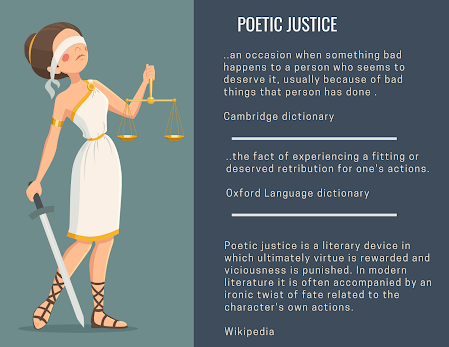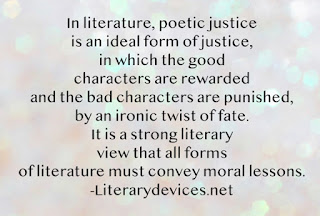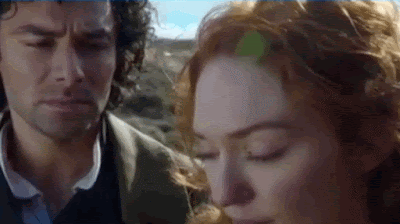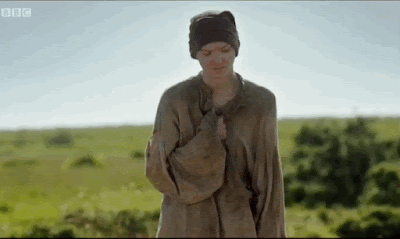"You see, in a play one knows virtue is going to be triumphant..."
Caroline Enys nee' Penvenen (Warleggan)
Except for the third there is at least one death in every book of the earlier set of seven books in the Poldark saga. In 'The Angry Tide' there are as many as five deaths including Sarah Enys, Mr Nathaniel Pearce, Reverend Osbourne Whitworth, Monk Adderly and Elizabeth Warleggan. So death is definitely a prominent feature of the Poldark story across all the books.
Winston Graham wrote some very compelling and vivid passages for many of the death scenes in the story. Very often they were interwoven with themes, metaphors and concepts that tied together with others scattered across the story and which were particular to the character. This post is the prelude to a series of blogs which will look at 'The nine big deaths of Poldark'. Rather than the deaths written for the sub plots these will be the nine deaths that are of particular significance to the Ross and Demelza story in regards to their love and life story together. These include the deaths of Julia Poldark, Francis Poldark, Agatha Poldark, Hugh Armitage, Monk Adderly, Elizabeth Warleggan, Jeremy Poldark, Stephen Carrington and the last death of the saga Valentine Warleggan. This series will look at the cause of each death and the themes that arise out of them together with the significance on the Ross and Demelza story. Also there can be no avoidance of the crucial question which is 'why?'. 'What was the reason for the death?' This is in terms of the reason in respect of the story. That will be a matter that is of particular interest.
Two Reasons To Kill The Character
Plot Device or Poetic Justice?
A Life And Story Changing Device
Typically death occurrences in literature are often what is called a 'literary plot device'. The definition of this is cited here on Wikipedia and other literature based sites as a 'technique to move the plot forward.' It can then enable an opening for a sharp development in a story which would not have occurred if not for the death. Or it can evoke a reaction in another character which then leads them to a change or a drastic action or a diversion of sorts. It still comes down to moving the plot forward because of the change in circumstance, experience or emotions brought on by the death. It is essentially a life changing development in real life and within stories readers will tend to feel the life changing effect for the remaining character or characters impacted by the death. Often for most writers there is a clear purpose with each death to enhance and build the story on its intended path.
Poetry in Motion
Likewise the explanation from Britannica.com goes on to draw on this connection with poetic justice and morality and states that the term (Poetic justice) was coined by 17th century English literary critic Thomas Rymer. He had believed that literature should uphold moral values. Indeed with the visual stories too, unless there is a sequel to finish off a movie it is not uncommon to see poetic justice served for the bad guys (or antagonists) and a happy ending for the good guys (or protagonists). It would probably be a struggle to name many final superhero movies which end with the baddie winning and the good guy going down. It's the same with romance and comedies and is all pretty standard formula unless a particular movie seeks to be an exception to the rule. The same applies with books and exceptions would leave readers in their hoards deeply unhappy or unsettled about how the author ended the story. Therefore literary agents do not usually encourage it for authors hoping to grow a strong and faithful readership.
Winston Graham - A Mind On Poetic Justice?
Despite this guidance on 'literary poetic justice' there are good characters that are still flawed and therefore characters that would not easily be defined as 'bad' characters or villains but that still met their death in the story. And on the other hand other characters thought of as 'bad' like George Warleggan who escaped death completely and therefore perhaps did not get their 'karma' or 'Poetic Justice' in the way that the reader might have craved for. But death is not the only way to administer mean poetic justice. Also whilst there is no literary law that states that a writer must in all works of literature strictly apply poetic justice for each and every character, the upcoming series of Poldark death blogs will still look at and investigate this matter in the individual deaths of those important/key nine characters that all directly or indirectly played a role in the story of Ross and Demelza. So as well as looking at what this achieved for the plot, it will also look at if Winston Graham seemed to enthuse any elements of poetic justice in them and what this was on account of.
"Let The Punishment Fit The Crime" ?
It so happened that in 1885 a very famous comic opera 'The Mikado' opened and includes the famous quote from its writer W.S Gilbert that "I'm really very sorry for you all, but it's an unjust world and virtue is triumphant only in theatrical performances." It is quite likely that this quote and concept inspired Graham's statement by Caroline but also it is not likely that it is just a coincidence that this comic opera had a very strong theme of death in the play and that this was tied to the idea as conveyed from another quote by W.S Gilbert in the very same opera show which was "Let the punishment fit the crime." W.S Gilbert did seem to apply that idea into his opera in respect of the deaths of the characters in it. It may well be that Graham in some way did too.
It is quite likely that with these ideas clearly in Graham's mind, that he like other great writers embraced the idea of using death in his story to sometimes reflect his own view about the virtuous and the unvirtuous in addition to using death simply and only as a plot device. Certainly the added context of poetic justice provides additional layers to a story and to the developments in it. There are indications from the beginning of his story that Graham was a writer that sought to add layers. In interview Graham did say that believing 'Warleggan' was his last book of the then four book saga, that he has wanted to write a love story with a 'happy ending' and that was it. So this indicates that Graham was an author that even if he did not tie up all the loose ends in the final chapters of his book, he nevertheless was one that wanted to follow the traditional approach of happy endings. Probably for those characters he felt deserving of this. An upcoming blog post will explore the endings of each book for Ross and Demelza and it is surprising that even in the seemingly sad endings Graham always seemed to leave a nugget of positivity and hope that would then bear fruit in the books that followed. His unpublished short story 'Christmas at Namapara 1820' after the last official book 'Bella Poldark' is a testament to this. However if he broadly sought to follow this traditional approach of happy endings for his main characters then he may likely have done the same with the concept of poetic justice. With the Poldark twelve book saga as his own 'play' and piece of fiction, Graham could honour the words he wrote for Caroline and the idea conveyed by W.S Gilburt by ensuring that virtue would indeed be rewarded and be triumphant and vice could go somehow go unrewarded.
Ross and Demelza Rewarded in Life? George Too?
Certainly in respect of his short story 'Meeting Demelza' written shortly before his death, Graham confirmed his view that Demelza was a unique and successful character and when looking at her journey from a poverty stricken street urchin to a titled lady Poldark, wife to a Baron and with a good home and lovely children, it seems clear Demelza was a character Graham chose to 'reward'. The same could be said for Ross who started the story a heartbroken almost bankrupt squireen but ended it a financially comfortable baron with a lovely wife, children and a happy home life. Of course if only for the purpose of good story content and the injection of realism there were still upsets along the way but none that destroyed their unity and happiness altogether. Still, although George Warleggan did not die and had some successes along the way, one might not quite agree that George ended up a 'rewarded' character. Of course as neither he nor Ross and Demelza died it would be for another post to look at how, if at all poetic justice was served for them. The Ross Poldark Vs George Warleggan series (including 'Seeds of Enmity, Fruit of War Pt1' and 'Encroachments and a Plan to Kill a Cat Pt2' touches on this and demonstrates that perhaps in their rivalry George's poetic justice was in his failure to take Ross down as he wanted and on occasion Ross intentionally or inadvertently striking a far reaching blow at George instead. Also George did not seem very much blessed with happiness generally. He was successful in many and also in securing the Duke of a sister for a second wife but all this did not seem to bring him happiness. As Demelza alluded to several times it is happiness that one should really only ever hope for. If happiness and 'contentment' (as Ross often worded it) is a measure of real success then she and Ross were in the end and this might separate the rewarded from the unrewarded.
The Nine Lives and Nine Deaths
The upcoming death blogs to follow are listed below. They will look at the hows and the whys and explore whether they were plot devices and if any element of poetic justice was at play within the context of Ross and Demelza's lives/story. As the individual posts are uploaded in sequence (beginning with Julia Poldark), the accompanying image will be clickable and lead to that character's post.
Deaths That Caused A Marital Storm
 |
 |
Julia Poldark was an innocent child. Her death seemed so wasteful. Born in the second book she also died in that same book. Her death was perhaps the first major blow for Ross and Demelza and very much rocked their marriage. But there were many aspects to this death which indicate a deliberate intent behind it.
Francis Poldark's death made way for the 'Demelza - Ross- Elizabeth' triangle to become active but given his past misdemeanours was there also an element of poetic justice in his death?
A Death With a Venomous Parting That Spread Far Afield
On the face of it Agatha Poldark's death seems to have been one that impacted only Elizabeth and George's story as her parting shot at George poisoned their marriage. However Ross and Demelza were not unaffected and given the malice in her final moments there is a basis to suppose there might have been an element of poetic justice in her death.
The Poet, The Monk And The Porcelain Lady (The Provocateurs)
 |
 |
 |
Hugh Armitage, Monk Adderley and Elizabeth Warleggan all featured as part of a love triangle with Ross and Demelza or otherwise at least tried to tempt either of them to unfaithfulness. That was either in thought or physical deed. In that case they were all provocateurs in their own ways. However they were not all villainous characters and so the element of plot device and poetic justice in their deaths may not be so straightforward.
A Sad Death for a Good Son?
Jeremy Poldark's death in the Battle of Waterloo is probably the most unexpected and heart-breaking death in the whole saga. This post will explore why this death happened, whether it was a plot device and if so what did it achieve? Of course as a character Jeremy is viewed as one of the 'good guys' therefore making it a trifle hard to think that poetic justice was a factor. So was this a most senseless and undeserved death in the Poldark saga?
The Bad Seeds, The Bad Boys
 |
 |
Even though they had difficult histories, undoubtedly Stephen Carrington and Valentine Warleggan have well developed characters as 'bad boys'. For Stephen his love story with Clowance antagonised not only Clowance but also her parents in having to decide whether to support or frustrate it. However there does appear to be themes that cross over with the Ross and Demelza love story and which may factor in to whether his death served as a plot device or not.
Valentine Warlegan's death has an obvious relevance on the Ross and Demelza story but although he is a bad boy the issue of plot device or poetic justice might seem somehow tied to stories and frustrations from the past with Elizabeth and George. Again this means that this too is not straightforward.
Related - Death in Poldark Blogs
Others of interest






















